B2B companies that achieve high customer satisfaction are 1.5 times more likely to outperform their competitors.
Yet, gathering meaningful feedback is often easier said than done.
What are your customers saying about your product?
Which features do they love, and what’s causing them frustration?
Are you addressing their needs or missing opportunities for improvement?
To truly deliver a product that resonates, you must unlock the “why” behind customer opinions. That’s where product feedback tools come in—helping you gather, analyze, and act on insights that drive growth and customer satisfaction.
In this blog, we’ve compiled the top product feedback tools and outlined how they can help you unlock customer insights to enhance your product.

What are the advantages of product feedback tools?
Product feedback tools are specialized platforms designed to gather, analyze, and act on user feedback throughout product development. They help businesses improve offerings based on customer insights, enabling the creation of user-centered solutions that foster stronger relationships and drive growth. These tools offer several advantages:
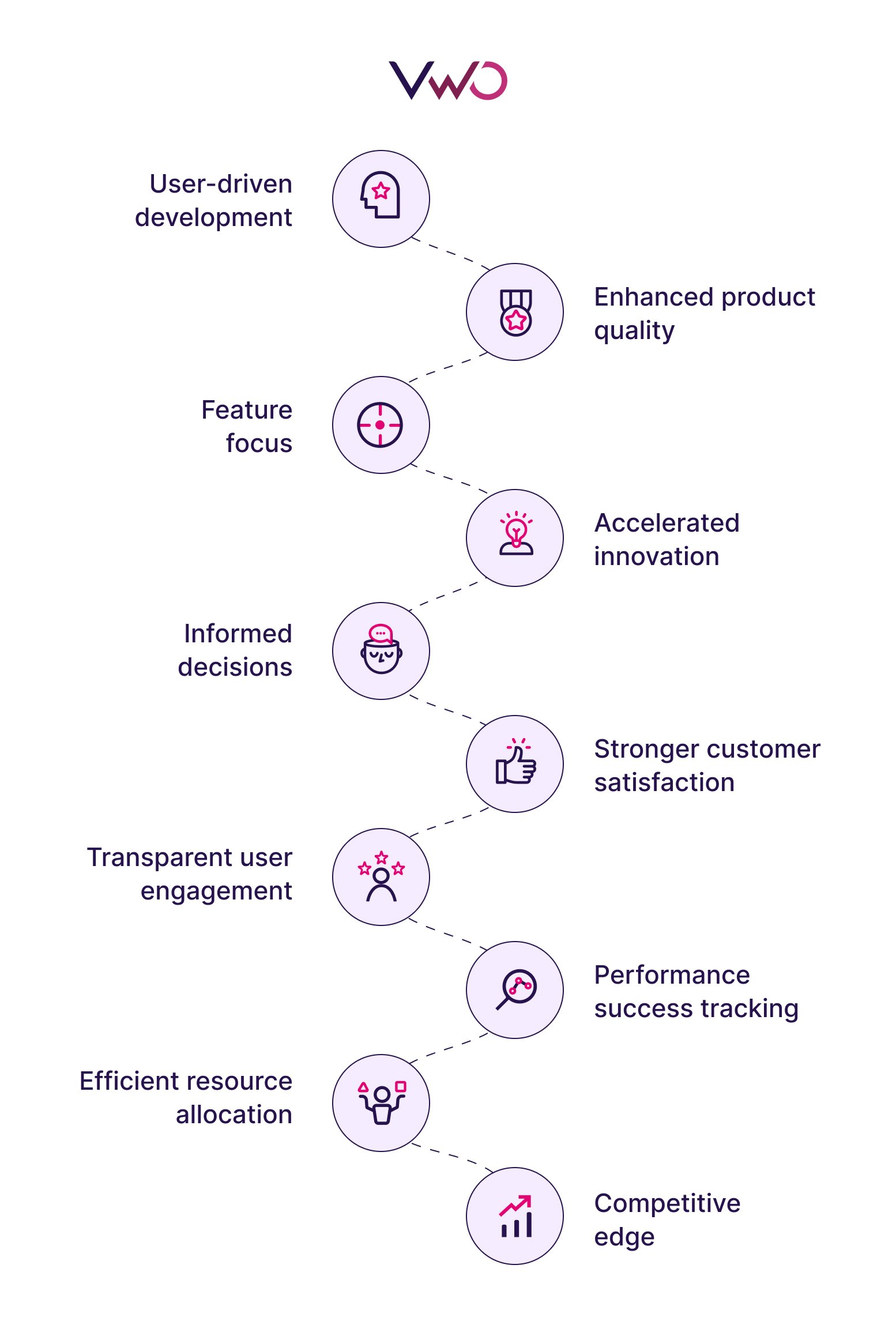
- User-driven development: Through direct user feedback, businesses can design products that better address customer needs, preferences, and challenges.
- Enhanced product quality: Feedback highlights usability issues, bugs, and areas needing improvement, enabling teams to enhance quality and user satisfaction.
- Feature focus: These tools help identify which features matter most to users, ensuring development efforts align with customer priorities.
- Accelerated innovation: Continuous feedback loops enable quick product iterations and adaptation to shifting user and market demands.
- Informed decisions: Feedback trends and data offer valuable insights that guide strategic product choices.
- Stronger customer satisfaction: Acting on feedback shows commitment to users, fostering trust and loyalty.
- Transparent user engagement: Encouraging users to participate in feedback initiatives builds open communication and trust.
- Performance success tracking: Metrics like Net Promoter Score (NPS) and customer sentiment offer clear product performance indicators.
- Efficient resource allocation: Aligning development efforts with user needs helps optimize resources and maximize ROI.
- Competitive edge: Consistently improving products based on user feedback helps businesses stand out.
What are the different types of product feedback tools to use?
Product feedback tools come in various forms, each tailored to specific methods of collecting and analyzing customer insights. While some tools overlap in functionality, they focus on different aspects of feedback, whether it’s through surveys, reviews, or monitoring customer discussions across channels. Here’s an overview of the main types:
- In-product feedback tools
- Visual feedback tools
- Voice of Customer tools
- Product analytics tools
- Feature voting boards
- Online review platforms
- Social media monitoring tools
- Feedback button tools
- User testing tools
- Online survey tools
- Customer satisfaction tools
Collectively, these tools empower businesses to uncover valuable customer insights, refine their products, and create experiences that align with user expectations. Using the right combination of tools, companies can make smarter decisions and stay ahead of customer needs.
Product feedback tools: Quick glimpse
- Survicate
- Qualaroo
- Refiner
- Marker.io
- Usersnap
- Userback
- Mopinion
- InMoment
- VWO
- UXCam
- Canny
- Trustpilot
- Brand24
- Appzi
- UserTesting
- SurveyMonkey
- Qualtrics
17 Best product feedback tools – Detailed analysis
In-product feedback tools
Surveys come in many forms, but in-product feedback surveys are unique as they are embedded within a product to gather real-time user feedback during interactions. They help identify pain points, improve experiences, and guide product decisions based on actionable insights.
1. Survicate
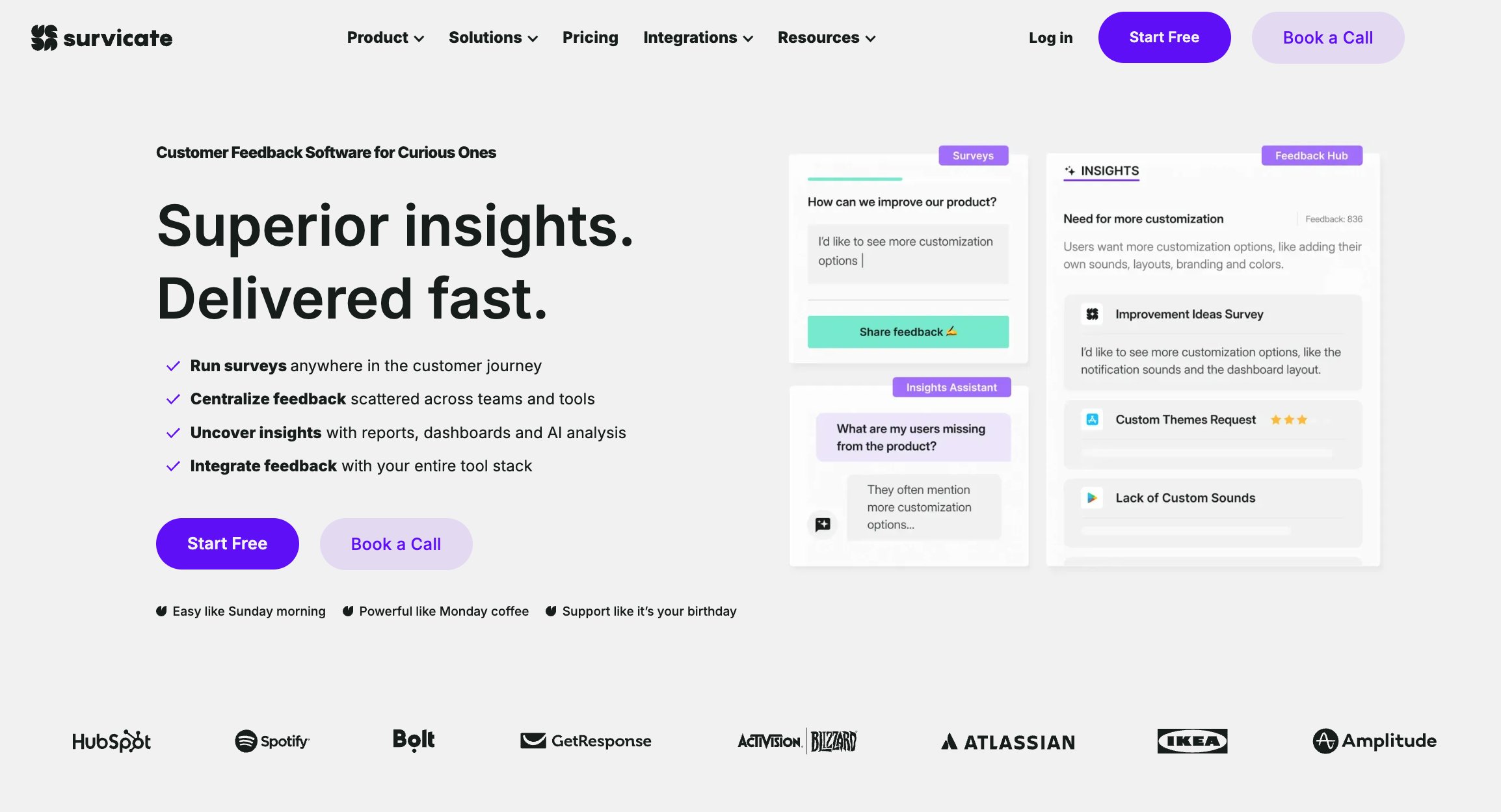
Survicate offers a product feedback tool that automates the collection and analysis of customer insights, helping you make data-driven decisions.
It enables you to gather highly contextual feedback through precisely targeted in-product micro-surveys (pop-ups) triggered based on user characteristics, cookies, or visit behaviors. Whether capturing user sentiment during onboarding, gathering event-triggered feedback, or identifying areas for improvement, Survicate ensures you receive actionable insights at the right time.
With Survicate, you can measure product experience metrics, uncover bugs, and enhance user satisfaction, creating a friction-free experience that keeps customers engaged and loyal.
Features: Website Feedback Surveys, Mobile In-app Surveys, Survey Templates, Survey logic & automatic translation, Automated follow-up Actions, NPS, CSAT, AI Assistant.
Pricing:
- The 10-day free trial includes all the Best plan features
- Free plan: Explore all features; 25 responses/month.
- Paid plans: Starts at $89/month, billed annually for 250 responses.
2. Qualaroo
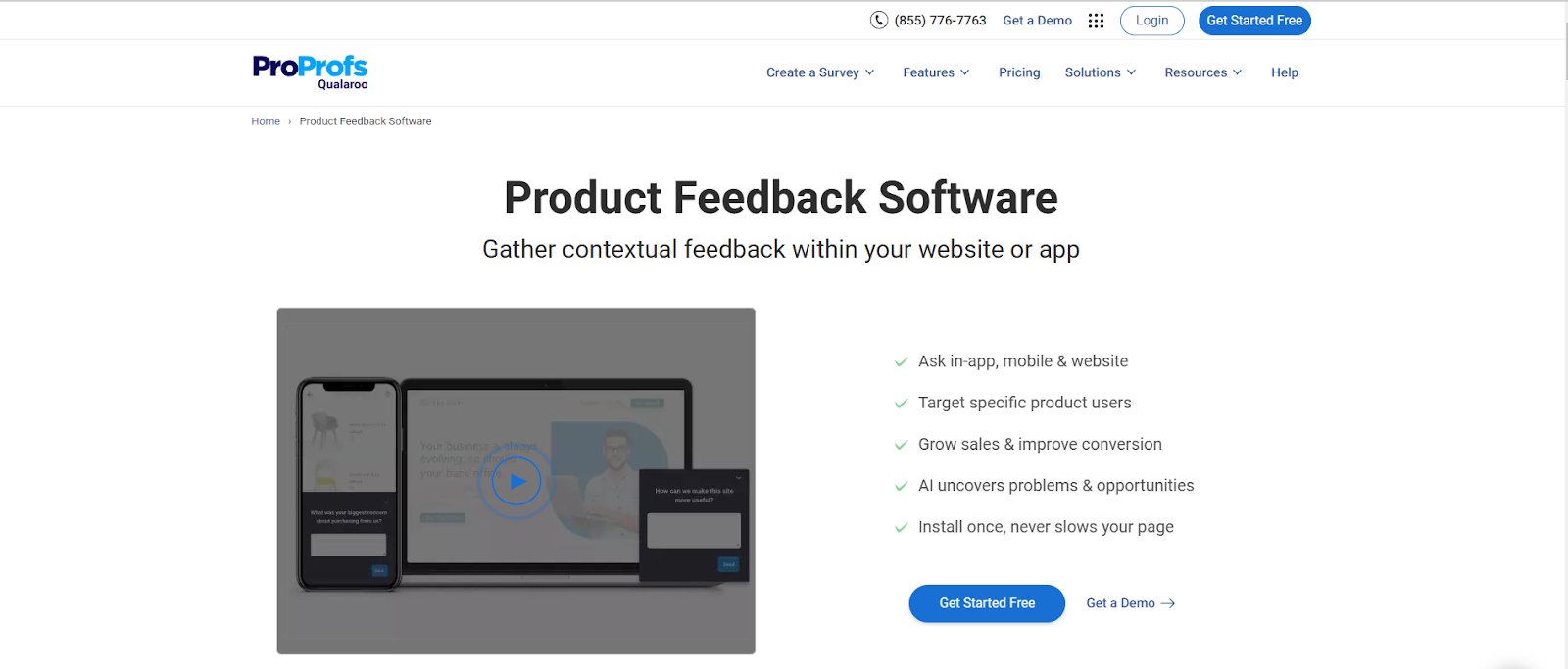
Qualaroo is a product feedback tool that captures contextual insights directly within your website, app, or product. Engaging users in real-time allows businesses to ask targeted questions at key moments, gathering actionable feedback that drives product improvements and business growth.
Qualaroo’s Nudge technology lets you target specific users based on behavior, location, visit depth, or activity. By asking the right question at the right time—like what’s stopping them from converting or which feature they value most—you gain precise insights that uncover roadblocks and opportunities.
Features: Advanced Targeting, Question Branching, AI Sentiment Analysis, A/B Testing, Exit Intent Survey, Integrations, Unlimited Surveys, Prototype Testing, AI Analytics & Reports
Pricing:
- Free: Up to 50 responses/forever.
- Paid: $19.99/month, billed annually
3. Refiner
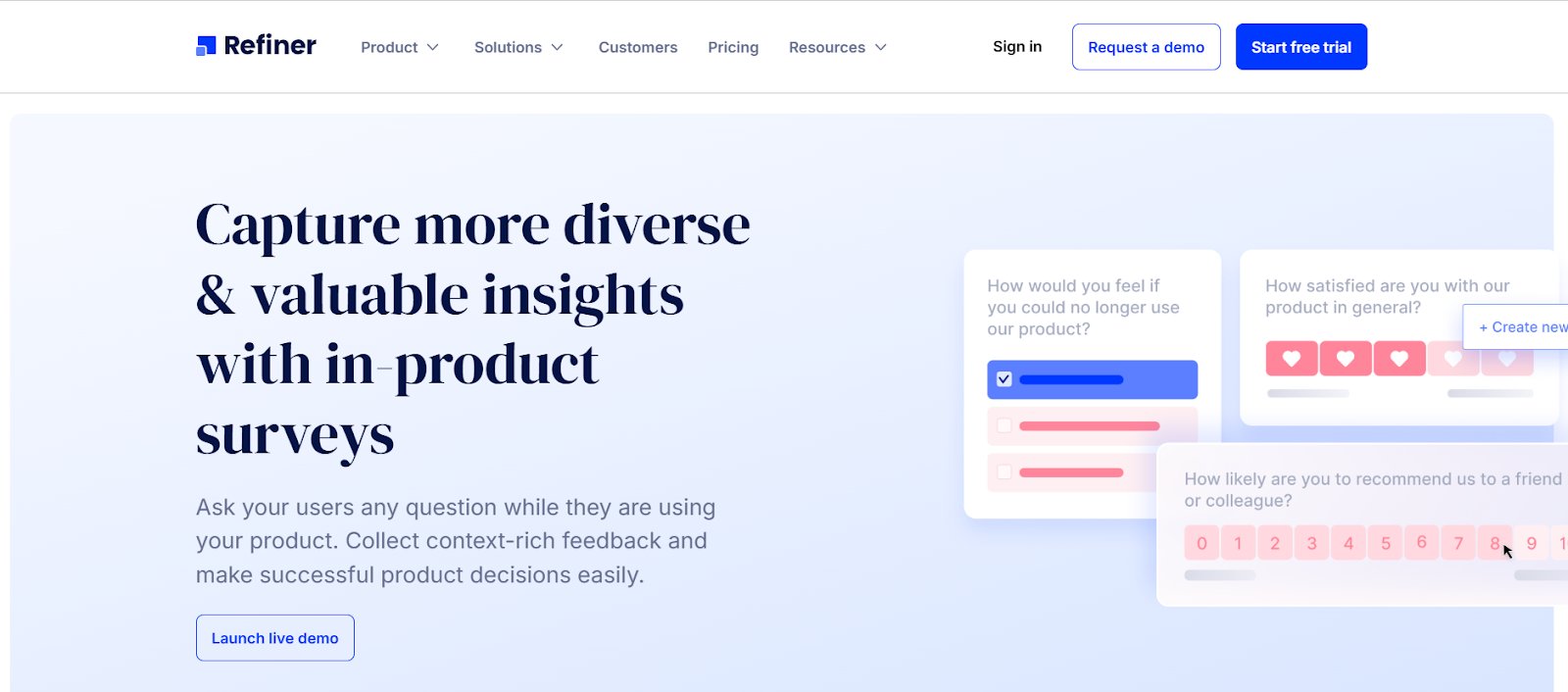
Refiner is a specialized micro survey tool designed for SaaS and digital products, enabling businesses to capture context-rich feedback directly from users while they interact with the product. With precise targeting and perfectly timed surveys, Refiner helps drive actionable insights for smarter product decisions and improved user experiences.
Refiner’s Branching Logic creates dynamic, personalized surveys by adapting questions based on user responses. This keeps surveys relevant, improves response quality, and reduces fatigue, helping businesses uncover deeper insights effortlessly.
Seamless integrations enable real-time data sync and automated workflows, simplifying segmentation, analysis, and action on valuable feedback.
Features: NPS, CSAT, Branching and Logic Jumps, Segmentation Engine, Customizable Surveys, Reporting Dashboard
Pricing:
- Free trial: 14 days for Essentials and Growth plans.
- Free: 25 survey responses/month, 1,000 MAUs, and 5,000 page views.
- Paid: Starts from $79/month, billed annually.
Visual feedback tools
Visual feedback tools allow users to share product feedback by annotating screenshots or video recordings highlighting specific issues or suggestions. They provide clear, contextual insights that streamline communication, helping teams quickly identify, prioritize, and resolve user-reported problems.
4. Marker.io

Marker.io is a seamless website feedback and annotation tool that integrates effortlessly with project management platforms like Jira, Trello, ClickUp, and Asana. Easy to install and lightweight, Marker.io captures detailed, context-rich feedback without interrupting workflows.
Perfect for agencies and development teams, Marker.io streamlines bug reporting and feedback collection during development or on live websites, ensuring faster resolution and more transparent communication.
Users can visually highlight issues using screen captures and markup tools with the annotation feature. Reporting is as simple as clicking the widget, annotating the screen, and sending feedback.
Features: Session Replay, Console Recording, Network Logs, Annotations, Bug Reporting, 2-way Integrations, Website Widget, Issue Sync.
Pricing:
- Free trial: 15 days for all plans.
- Paid: Starts from $39/month, billed annually.
5. Usersnap
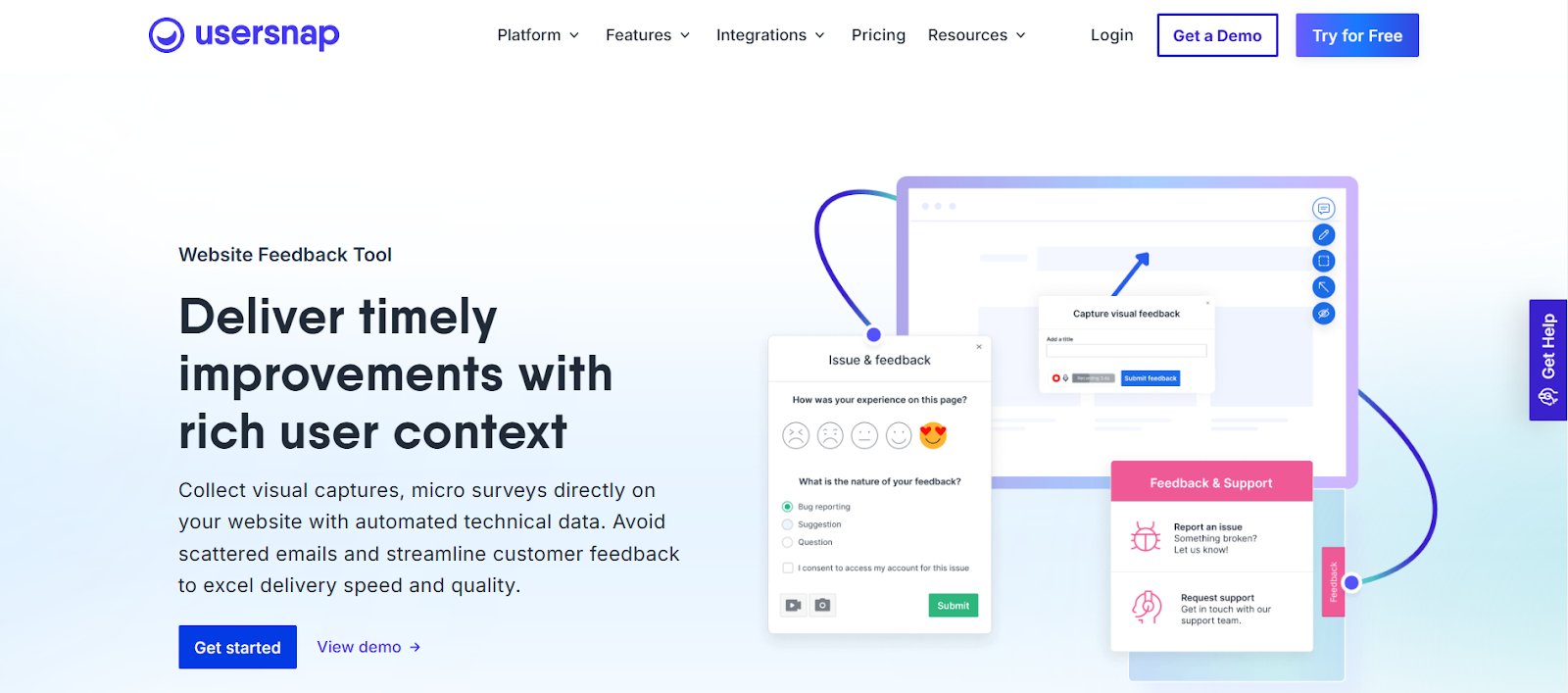
Usersnap is an all-in-one customer feedback platform designed to collect, organize, and manage feedback effortlessly. It integrates seamlessly with tools like Jira, Azure DevOps, Trello, and Slack, streamlining workflows and enabling faster issue resolution.
Usersnap enhances clarity with visual feedback, allowing users to capture screenshots and videos of their experience. Built-in annotation features like drawing and pinning comments help teams quickly identify and address issues, while technical metadata provides added context for more effective troubleshooting.
Features: Customized Microsurveys, AI-Suggestions, AI Smart Labels, Feedback Button, Feature Request Board, Bug Tracking, Screen Capture
Pricing:
- Free trial: 15 days for all plans.
- Free: First 20 feedback items.
- Paid: Starts from $39/month, billed annually.
6. Userback
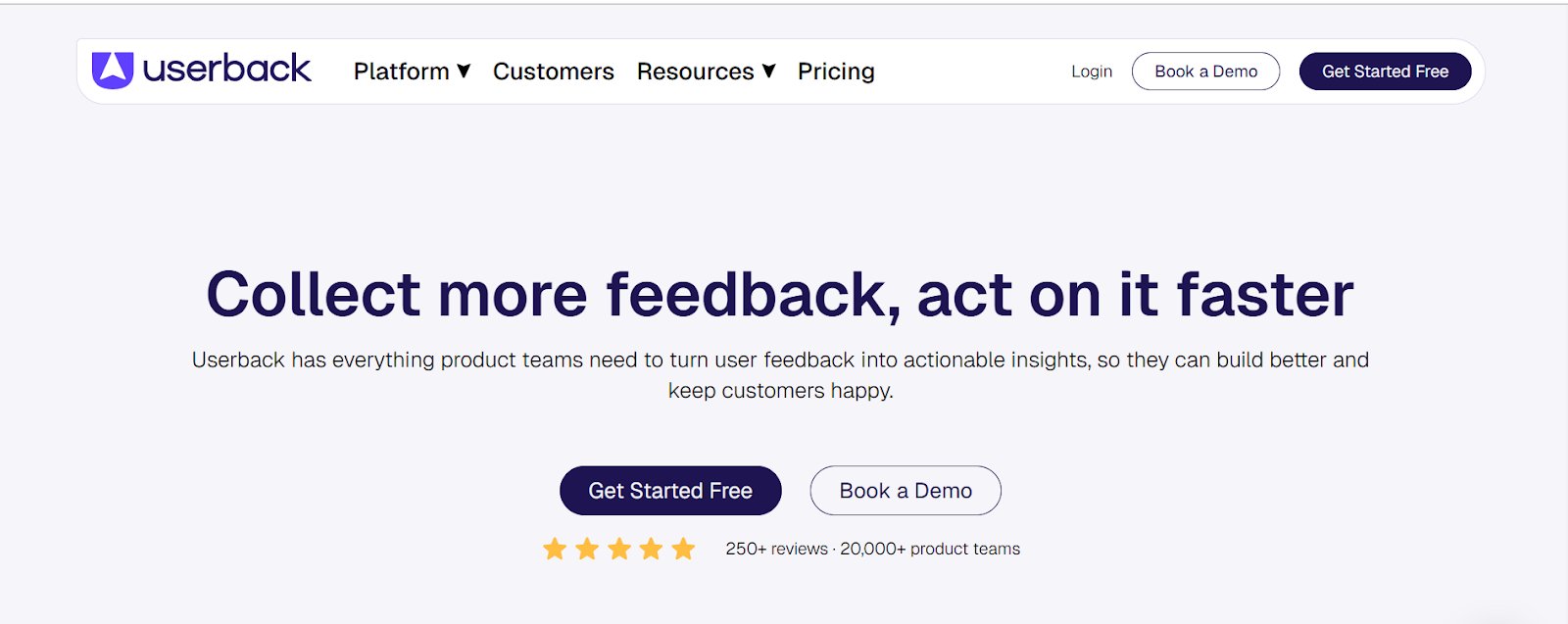
Userback is a product feedback tool that captures real-time input through a dedicated feedback widget on your website or app. Users can annotate screenshots, highlight issues, and provide detailed feedback directly at the source, eliminating the need for emails. With instant notifications and integrations like Jira, Trello, and WordPress, Userback streamlines workflows for product teams.
The Feature Portal engages users by letting them view, vote on, and comment on upcoming features. This collaborative space helps teams make data-driven decisions, prioritize user-driven improvements, and create better products.
Features: User Segments, User Surveys, Bug Reports, Feature Requests, No-code Browser Extension, User Identification, Integrations, Session Replay
Pricing:
- Free trial: 14 days of the Scale plan.
- Paid: Starts from $49/month, billed annually.
Voice of Customer tools
Voice of Customer (VoC) tools capture and analyze customer feedback across various touchpoints, such as surveys, reviews, and social media. They provide insights into customer preferences and pain points, helping businesses enhance customer experiences, drive loyalty, and make data-driven decisions to improve products and services.
7. Mopinion
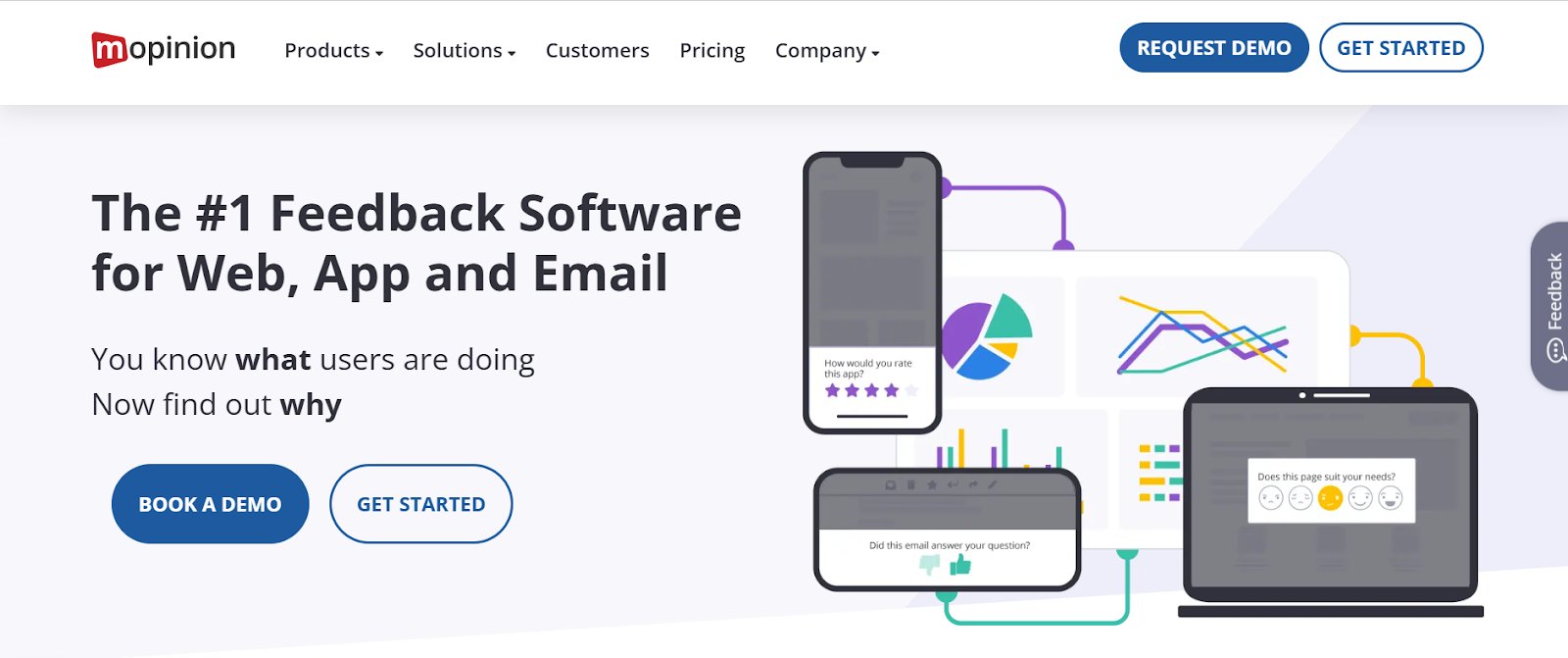
Mopinion is a Voice of Customer (VoC) tool that helps businesses optimize digital experiences across multiple channels by uncovering the “why” behind customer behavior. It offers an all-in-one solution to collect and analyze real-time feedback, with an intuitive interface for creating and customizing feedback forms.
Mopinion’s Conversational Feedback introduces chat-like forms for a casual, engaging, and seamless feedback experience. These forms integrate effortlessly with websites, apps, and emails, encouraging users to share insights naturally. By promoting better engagement, they capture meaningful data while leaving customers with a positive impression.
Features: Text Analytics, Unlimited Surveys, Real-Time Analysis, Automated Tags, Conversational Feedback, API & Integrations, Dashboards, Text & Sentiment Analysis
Pricing:
- Free trial: 14 days of full access to all the features.
- Paid: Starts from $259/month, billed annually.
8. InMoment
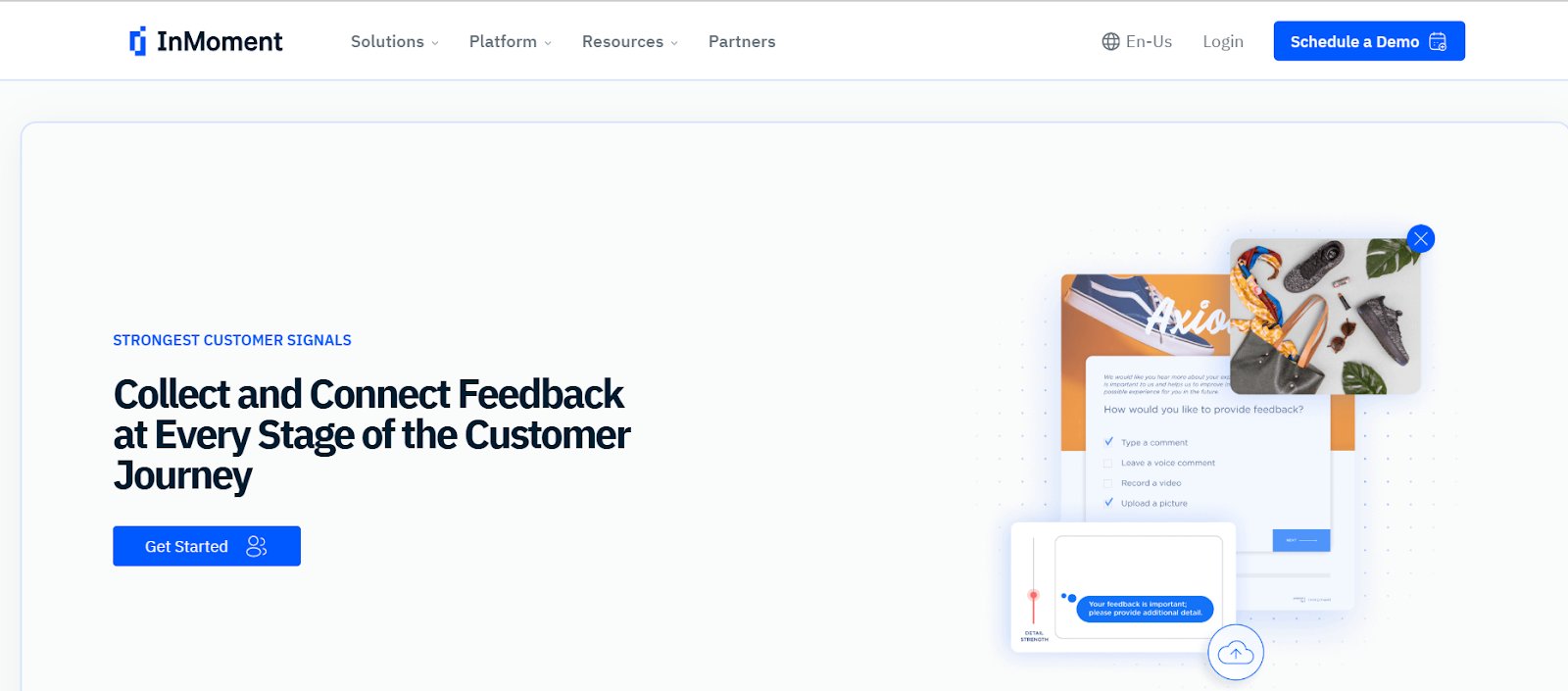
InMoment is a cloud-based platform enhancing customer experiences with solutions like Social Reviews, Advocacy, Employee Engagement, and a robust Voice of the Customer (VoC) platform. It simplifies feedback collection and analysis with real-time reporting, alerts, and integrations into tools like Salesforce, Zendesk, and HubSpot, empowering businesses to improve customer experiences.
The Active Listening Studio uses AI-powered conversational forms to gather real-time feedback across all channels. Enriching this feedback with behavioral and contextual data gives businesses actionable insights to drive meaningful improvements.
Features: Omnichannel Feedback, Survey Builder, Question Logic, AI-Powered Active Listening, Conversational Intelligence, Social Reviews, Microsurveys
Pricing:
- Plans are not available on the website.
Product analytics tools
9. VWO
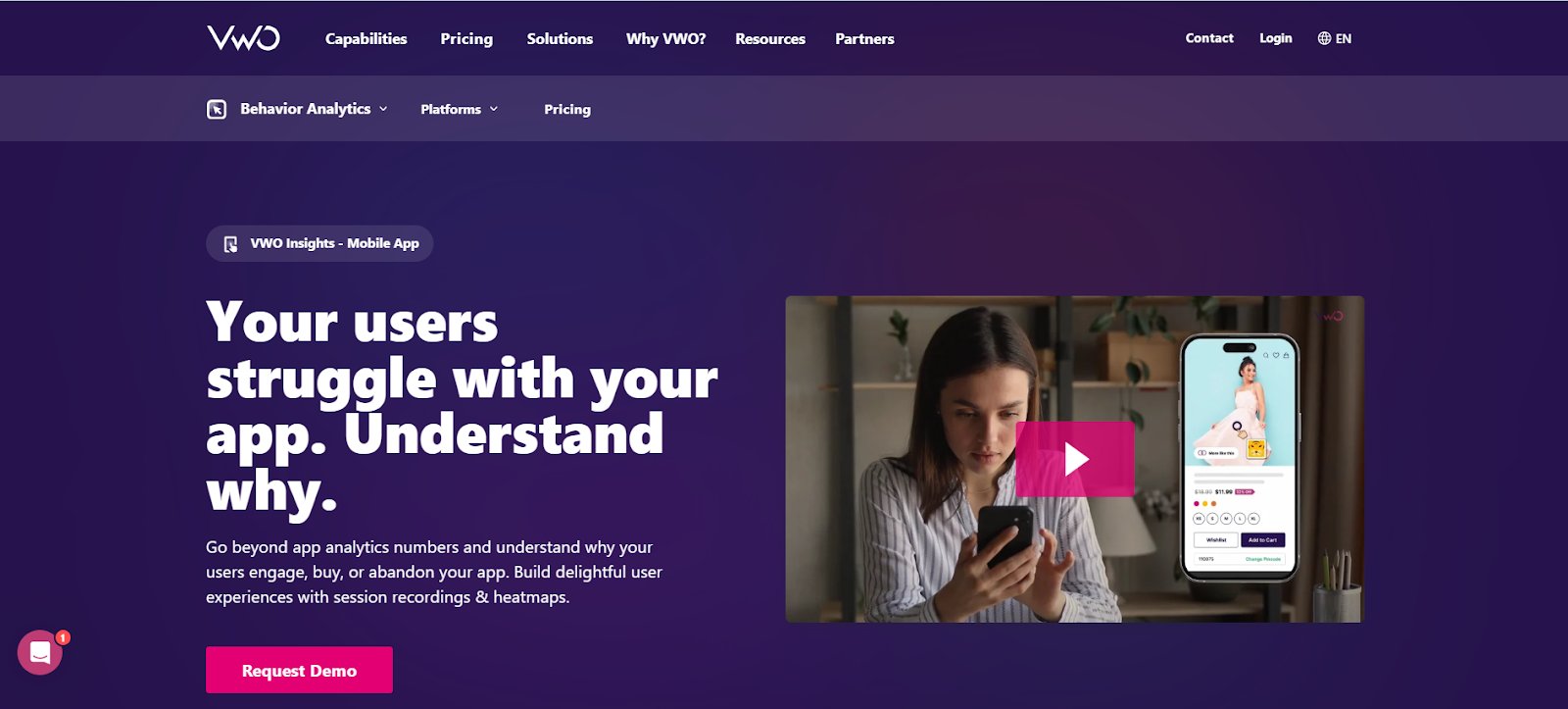
VWO is a conversion rate optimization platform that enables businesses to optimize experiences on any device by leveraging real-time user feedback and behavioral data. It helps businesses uncover actionable insights to test, refine, and personalize the user experience by tracking and analyzing interactions across websites and mobile apps.
With its comprehensive suite, VWO enables teams to collect feedback, validate hypotheses, and optimize complex use cases, from content and feature variables to server-side functionality.
By integrating feedback collection with behavioral analytics, VWO equips businesses with the tools to enhance user satisfaction, optimize experiences, and boost conversions.
Key features:
Surveys
VWO on-page surveys capture real-time feedback from website visitors, providing 360-degree insights into customer experiences. Surveys can be triggered based on user actions, like time on page or exit intent, ensuring feedback is collected at critical moments.
With customizable question formats, segmentation options, and multilingual capabilities, VWO allows businesses to gather targeted and actionable insights from diverse customer groups.
AI-powered features streamline question creation and analyze responses, delivering concise summaries and identifying key trends efficiently.
Mobile-app insights
VWO Mobile-App Insights empowers businesses to track and analyze user behavior using session recordings and heatmaps, delivering qualitative insights to optimize critical user journeys. It helps businesses refine the user experience, build trust, and drive app growth with actionable behavior analytics.
Use the app-insights dashboard to identify and prioritize app issues like crashes and friction points, analyze trends, and target fixes based on user behavior, segments, and devices.
Heatmaps
Heatmaps visualize where users tap and scroll on your app screens, highlighting areas that receive the most and least attention. They eliminate the need for complex numerical analysis, offering quick and intuitive insights into user behavior.
Heatmaps allow businesses to enhance CTA engagement by identifying underperforming elements and making design adjustments to encourage action. They also support hypothesis testing by validating changes, like rearranging app sections to boost visibility and interaction. Additionally, heatmaps identify UI clutter, helping teams simplify designs for a more intuitive experience.
Success case:
U-Digital, a Netherlands-based digital agency, boosted mobile conversions by 21.46% for a skincare eCommerce client using VWO’s Experience Optimization Platform. Identifying friction with Google Analytics and VWO Heatmaps, they tested a sticky Add-to-Cart button. A 23-day A/B test with 7,200 visitors confirmed the improvement, leading to the implementation and further optimization of key eCommerce pages.
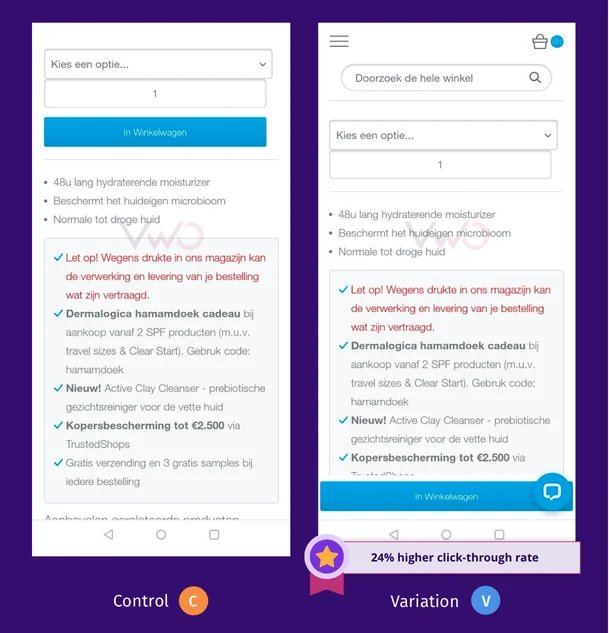
Session recordings
Session recordings provide video replays of user interactions with your app, capturing events like taps, screen views, crashes, and scrolls. By linking these actions to user profiles, they help businesses analyze complete user journeys to identify friction points and abandonment moments.
These recordings assist in addressing abandonment issues, such as app crashes or unresponsiveness, by pinpointing root causes and enabling faster resolutions without requiring detailed user input. They also enhance UX research by complementing surveys and interviews with actual user behavior, improving collaboration, and supporting data-driven usability refinements.
Pricing:
- Free trial: 30 days to explore all features
- Paid: Request pricing for mobile app insights
10. UXCam
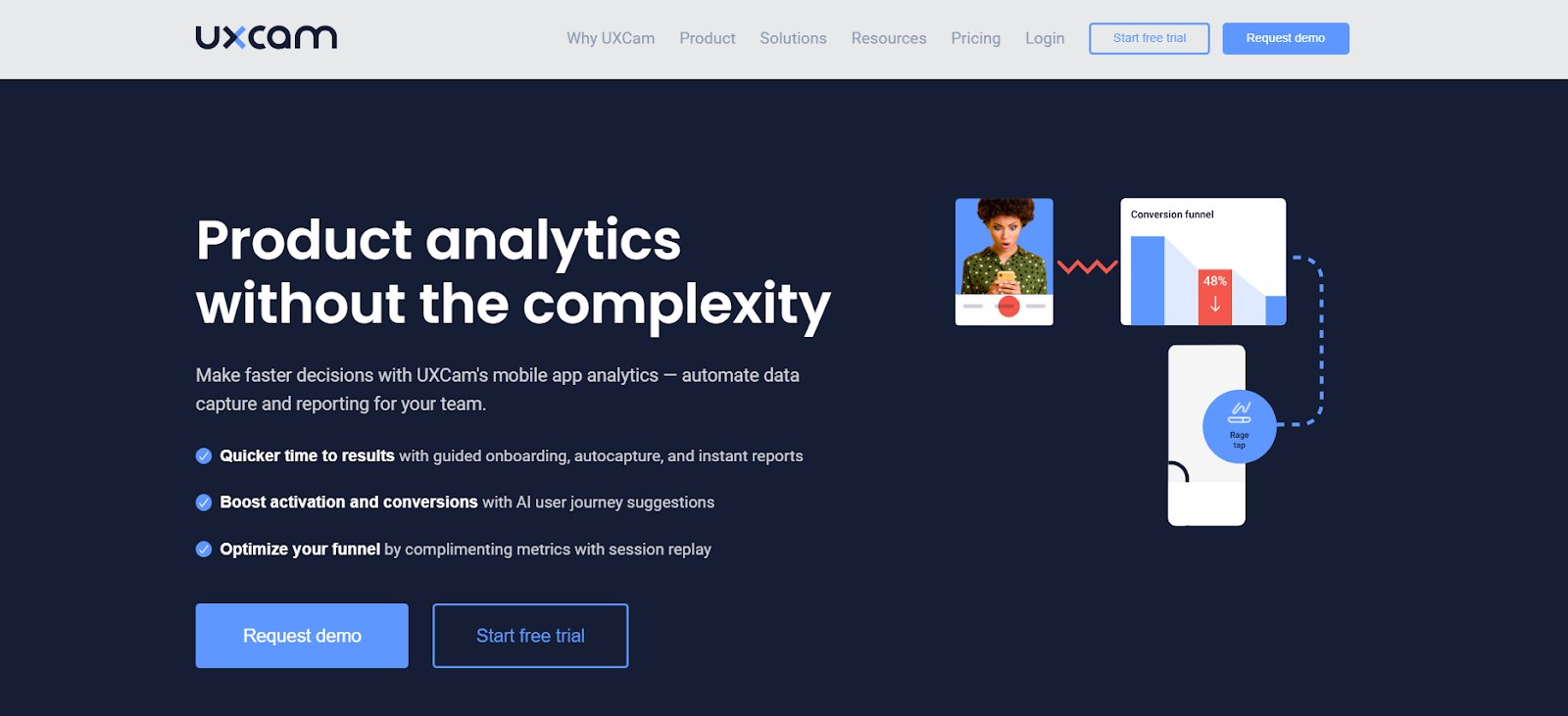
UXCam is a product analytics tool that helps monitor and analyze user behavior in mobile apps, providing teams with actionable insights to enhance performance and engagement.
With heatmaps and session replays, UXCam uncovers the “why” behind user drop-offs by tracking interactions and identifying friction points. Its screen flows feature offers a detailed view of user journeys, revealing navigation patterns, analyzing flows between start and end screens, and pinpointing problematic screens where users exit.
UXCam equips teams with the required tools to optimize app usability, improve user retention, and create seamless experiences.
Features: Heatmaps, Session Replays, AI-User Journeys, Event Analytics, Funnels, Segmentation, Team Dashboards
Pricing:
- Free trial: 14 days for all plans.
- Free: Up to 3000 monthly sessions.
- Paid: Request pricing.
Alternatives: Mixpanel, Userpilot
Feature voting board tools
Feature voting board tools let users suggest and vote on the most valuable product features, helping businesses prioritize development based on user demand. By involving customers in the process, these tools foster transparency, build trust, and ensure products align with customer needs.
11. Canny
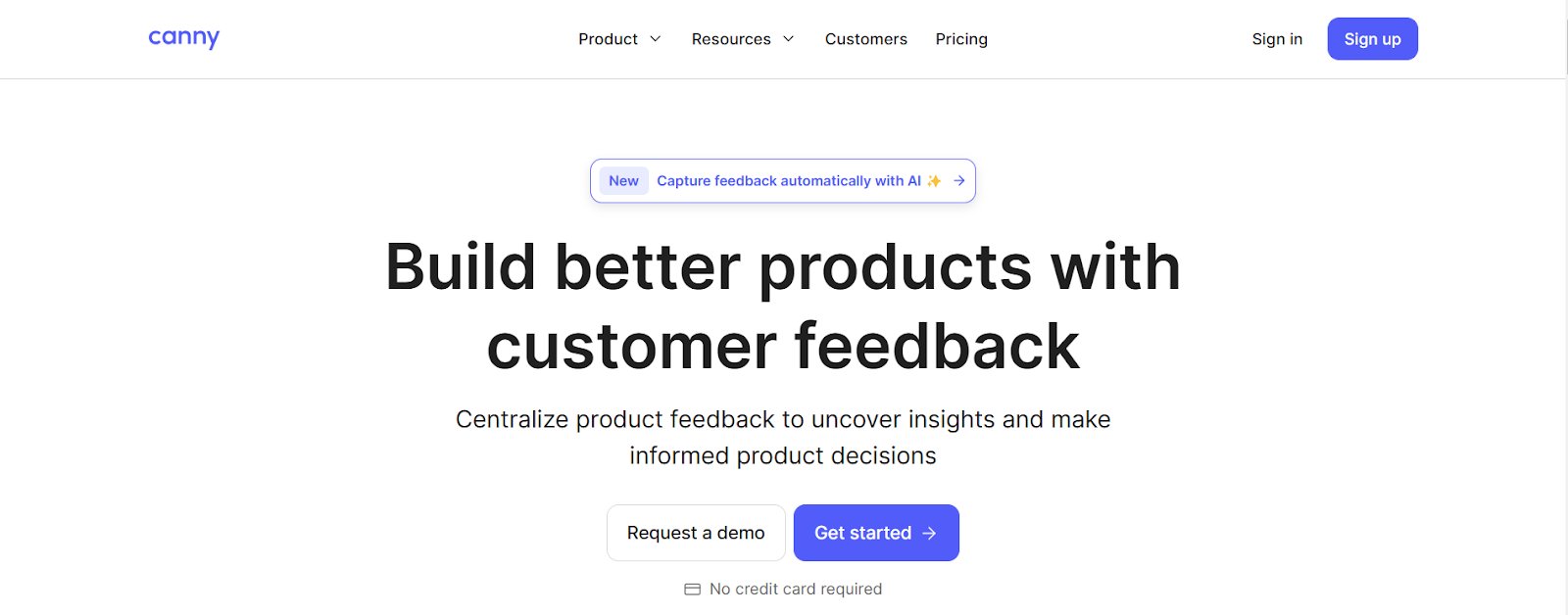
Canny is a product voting and feedback analysis tool that helps businesses understand customer needs and build user-driven products. Its feature voting board allows users to vote for their favorite features, while the analysis dashboard helps prioritize development, segment users, and track progress.
Canny consolidates feedback from various sources and integrates seamlessly with project management tools. Its Changelog feature informs users about updates, closing the feedback loop by notifying voters when features are released. Canny streamlines feedback management, making product development more efficient and customer-focused.
Features: User Segmentation, Changelog, Autopilot, Feedback Discovery, Comment Summaries, Canny Identify, Integrations, Feature Requests Management
Pricing:
- Free trial: For Starter and Growth plans.
- Free: Basic features to set up feedback portal.
- Paid: Starts from $79/month, billed annually.
Online review platforms
Online review platforms are digital spaces where customers can share feedback about their experiences with products or services. They help businesses build trust, enhance credibility, and gather insights to improve offerings while influencing purchasing decisions.
12. Trustpilot

Trustpilot is a leading platform for collecting and showcasing customer feedback, empowering businesses to build trust and improve their online reputation. By collecting and publishing verified service and product reviews, Trustpilot provides current and potential customers with authentic insights into user experiences.
Businesses can collect customer feedback by sending review invitations for free, uploading mailing lists, or automating emails to be sent after purchases, ensuring timely and unbiased feedback collection without offering incentives.
Features: Business Profile Page, Customizable Review Invitations, Trustpilot Widgets, AI-assisted Review Responses, Automated Review Invitations, Analytics & Insights, Sentiment Analysis
Pricing:
- Free: 50 review invitations/month.
- Paid: Starts from $259/month, billed annually.
Social media monitoring tools
Social media monitoring tools track mentions, keywords, and trends across platforms to provide insights into public sentiment, brand perception, and competitor activity, enabling data-driven decisions. These tools are essential for managing reputation, engaging with audiences, and identifying growth opportunities.
13. Brand24
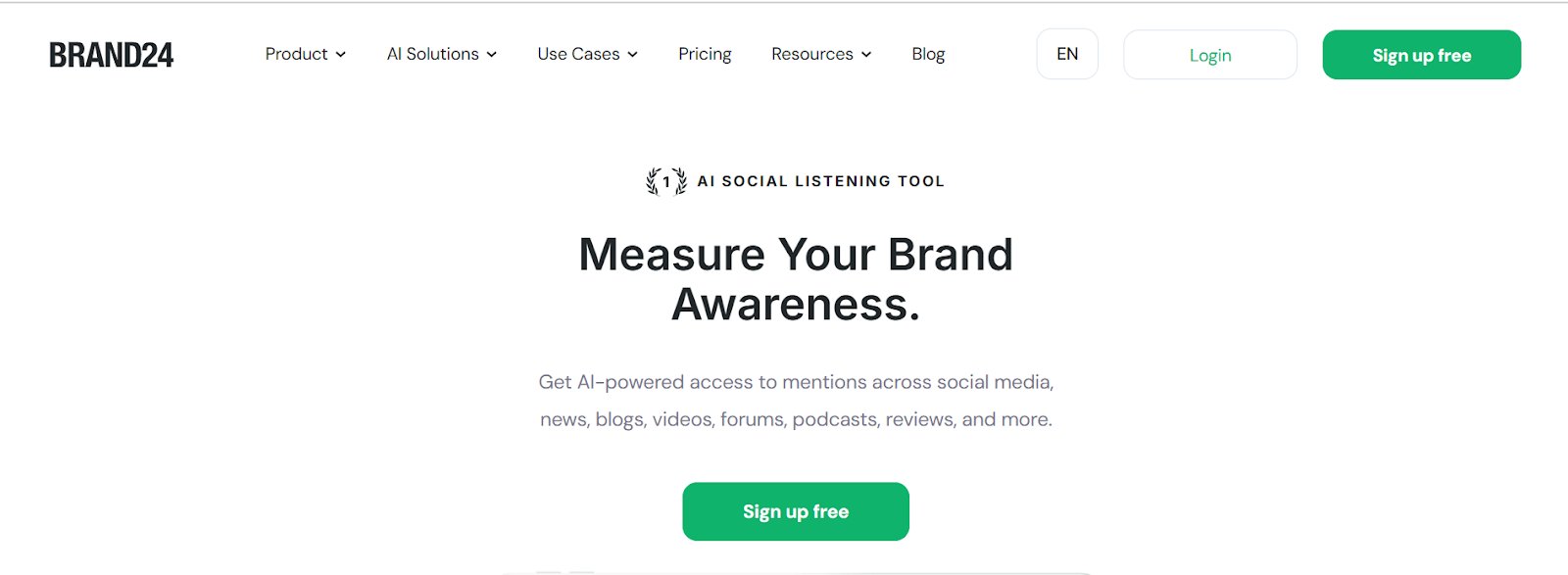
Brand24 is an AI-driven social listening tool that helps businesses protect their brand, measure awareness, analyze competitors, and gain customer insights. It monitors mentions across social media, blogs, news, videos, and more, informing you of real-time public sentiment and industry trends.
With instant notifications and hashtag tracking, Brand24 simplifies filtering product feedback, enabling marketing and customer success teams to act quickly. Stay ahead of competitors and align with customer needs using Brand24’s comprehensive monitoring.
Features: Advanced Filtering, AI Anomaly Detector, AI Insights, Sentiment Analysis, Presence Score, Influence Score, Voice Share, Emotion Analysis
Pricing:
- Free trial: 14 days for all features.
- Paid: Starts from $119/month, billed annually.
Alternatives: Meltwater, Mentionlytics
Feedback button tools
Feedback button tools are simple, interactive elements on websites or apps that let users share feedback effortlessly. A direct channel for reporting issues or sharing suggestions helps businesses collect actionable insights to improve user experience and address concerns effectively.
14. Appzi
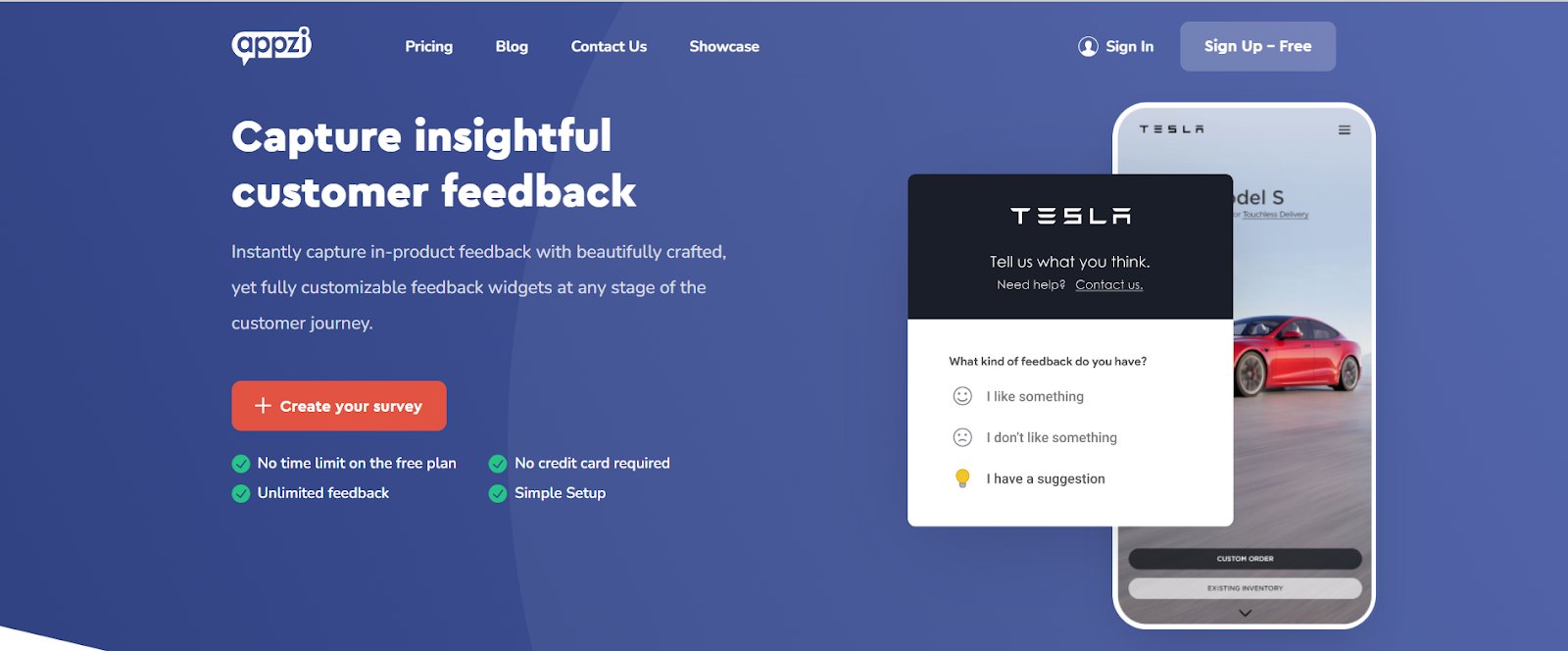
Appzi is an intuitive feedback tool that captures in-product insights through customizable widgets on websites and SaaS products. With no-code micro surveys launched as pop-ups, inline widgets, or feedback buttons, Appzi ensures targeted feedback collection from the right users at the right time.
Appzi’s analytics dashboard offers detailed insights, including user responses, screenshots, URLs, and user data, providing clear context on customer actions during feedback submission. Appzi makes it easy to gather actionable insights and build user-driven products.
Features: Advanced User Targeting, Reporting Dashboard, Unlimited Customizable Surveys, Integrations
Pricing:
- Free: Forever for up to 50,000 page views /month.
- Paid: Start from $29/month.
User testing tools
User testing tools allow businesses to evaluate how real users interact with their products, websites, or apps. They provide insights through recorded sessions, surveys, or live tests, helping identify usability issues and areas for improvement. These tools enable teams to refine their designs, enhance user experience, and ensure products meet customer expectations.
15. UserTesting
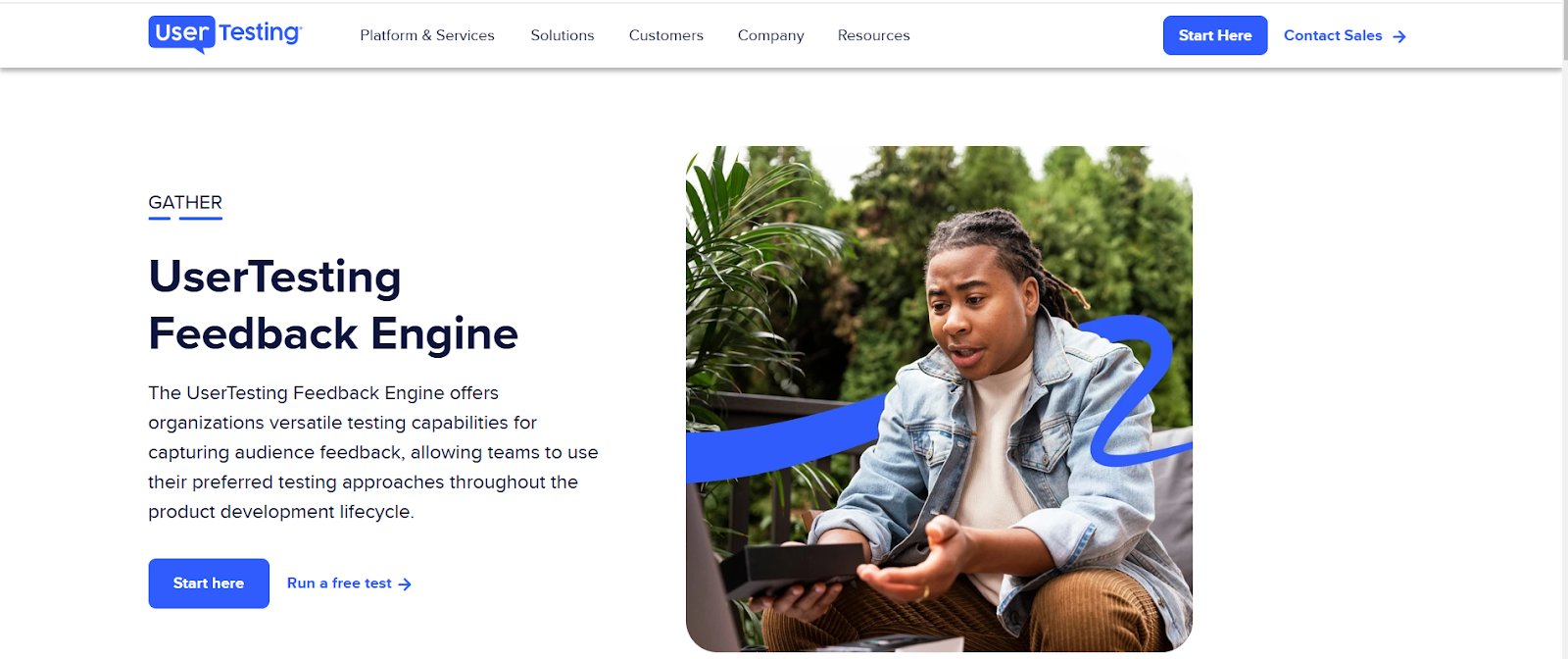
UserTesting connects businesses with real users to gain valuable insights into how they interact with products, designs, or messaging.
Businesses can quickly receive video feedback of users’ first impressions by submitting a URL, providing actionable insights in minutes. This fast and efficient approach helps refine digital experiences and create products that truly resonate with customers.
Features: Unmoderated Tests, Feedback Engine, Website Testing, Customer Journey Mapping, Benchmarking, AI-powered Analytics, Sentiment Analysis, Card Sorting, Tree Testing, Prototype Testing
Pricing:
- Prices are not available on the website.
Alternatives: Maze, Userlytics
Online survey tools
Online survey tools enable businesses to create and distribute surveys to gather feedback from customers, employees, or target audiences. They provide insights into preferences and satisfaction, helping organizations refine strategies with customizable templates and real-time analytics.
16. SurveyMonkey

SurveyMonkey is a leading survey platform that enables businesses to gather meaningful customer feedback and insights. Its intuitive interface, customizable templates, and robust analytics help organizations make data-driven decisions to enhance customer satisfaction and overall experiences.
Features: SurveyMonkey Genius to create AI-powered surveys, Multi-survey analysis, and SurveyMonkey Audience for targeted insights.
Pricing:
- Paid: Starts from $20/user/month, billed annually.
Alternatives: Delighted, Typeform
Customer satisfaction tools
Customer satisfaction tools are platforms designed to measure and track customer happiness and experiences. They collect feedback through surveys and other methods, providing insights to identify pain points and improve service. These tools help businesses strengthen relationships and boost customer loyalty.
17. Qualtrics
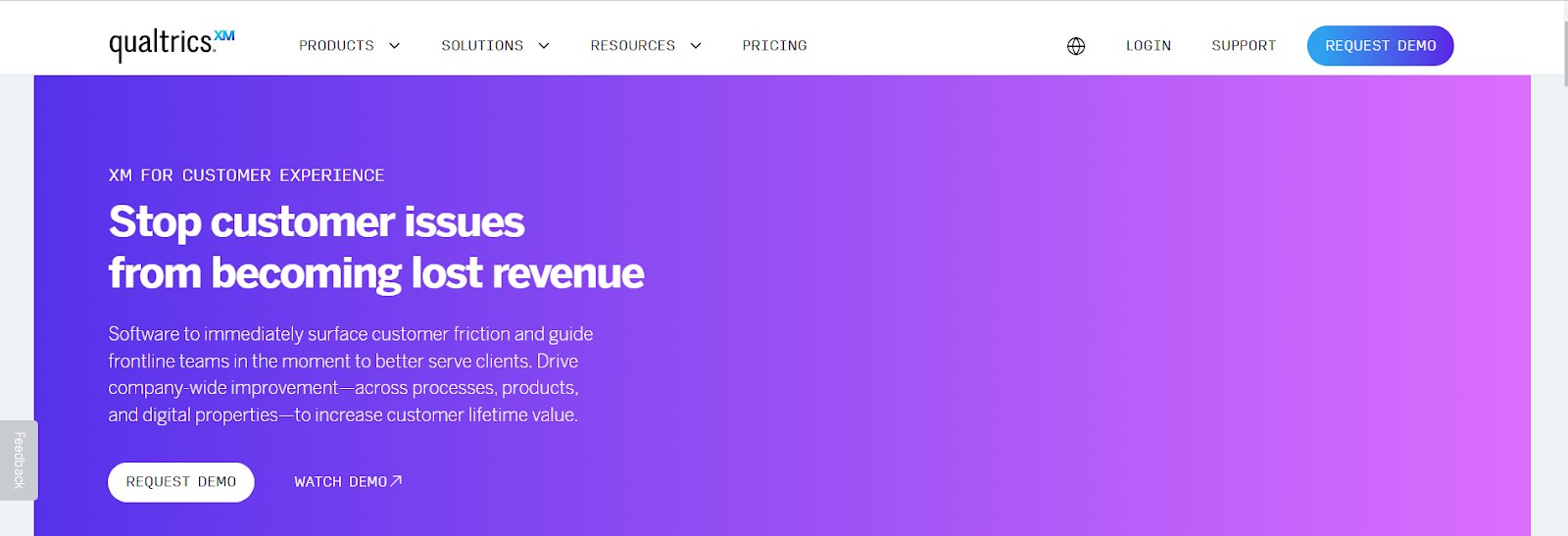
Qualtrics is an experience management platform that helps businesses deliver exceptional omnichannel experiences. By capturing customer feedback at key moments in the journey, Qualtrics provides a comprehensive understanding of customer interactions, enabling organizations to identify opportunities to improve satisfaction, retention, and acquisition.
Its intuitive interface allows teams to create multi-channel surveys, track feedback in real-time, and leverage advanced analytics to enhance customer satisfaction and optimize team performance.
Features: Website & App Feedback, Behavioral Analytics, Omnichannel Reputation & Review Management.
Pricing:
- Plans are not available on the website.
Alternatives: NiceReply, AskNicely
How do we organize product feedback effectively?
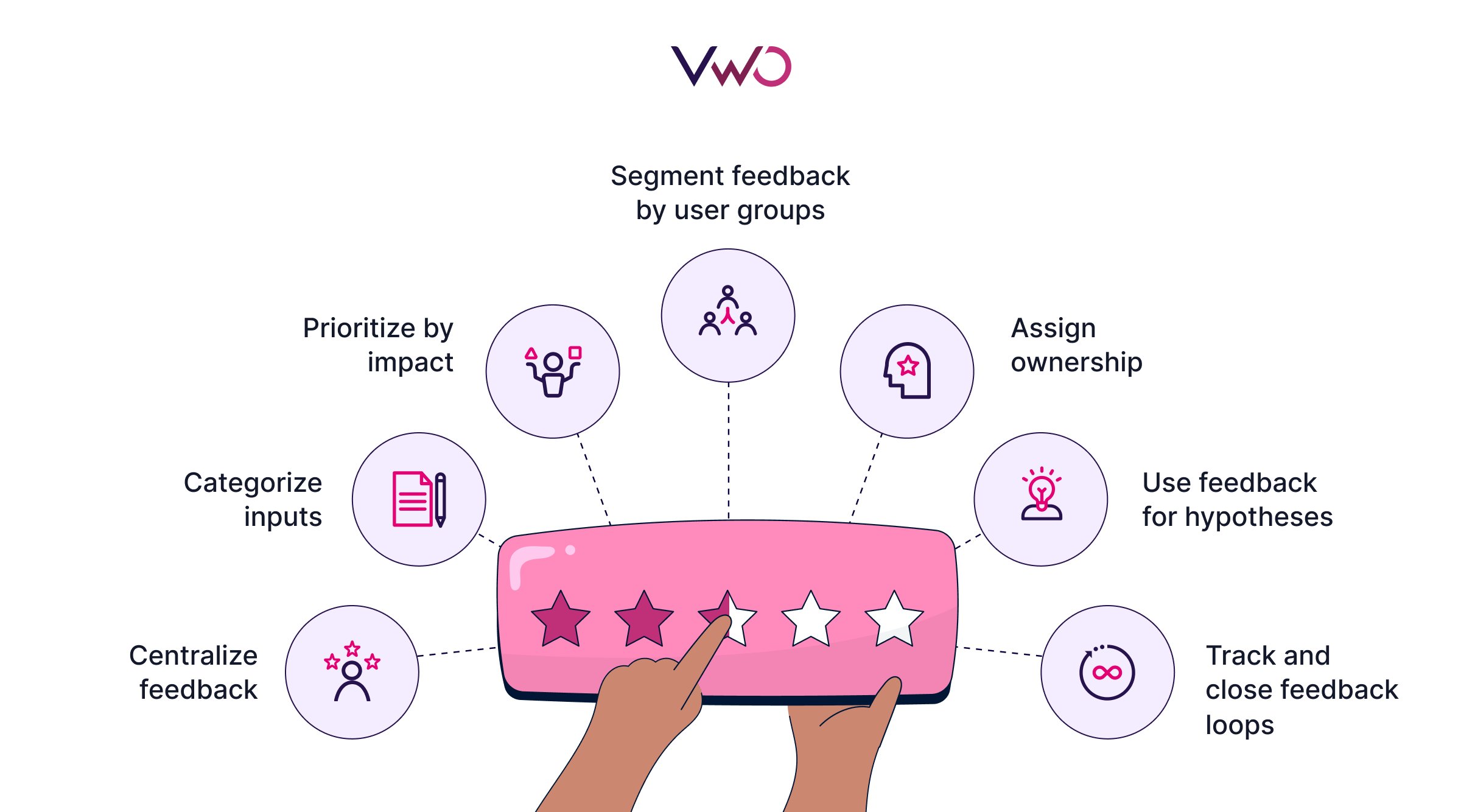
Effectively organizing product feedback is essential for understanding user needs and making data-driven decisions. A structured approach ensures that raw feedback is transformed into actionable insights, enabling businesses to enhance their products and deliver exceptional user experiences.
- Centralize feedback: Use a dedicated tool or platform to collect and store all feedback from various sources like surveys, reviews, customer support, and social media in one place.
- Categorize inputs: Organize feedback into categories like feature requests, bug reports, usability issues, and general suggestions to make it manageable and actionable.
- Prioritize by impact: Use criteria such as frequency, user segment importance, and potential business impact to rank feedback for action.
- Segment feedback by user groups: Analyze feedback by user types, such as new vs. returning customers or free vs. paid users, to tailor solutions to specific needs.
- Assign ownership: Designate teams or individuals responsible for addressing specific feedback categories or issues.
- Use feedback for hypotheses: Convert recurring feedback into testable hypotheses for product improvement or innovation.
- Track and close feedback loops: Regularly review implemented changes and communicate outcomes to users who provided feedback, showing that their input matters.
Conclusion
Product feedback is more than just data—it’s the foundation for creating meaningful user experiences and staying ahead in competitive markets. The tools listed here empower you to uncover insights, prioritize improvements, and deliver solutions that resonate with your audience.
However, gathering feedback is only the first step. To unlock its potential, you need a platform like VWO that enables testing, analyzing, and optimizing every aspect of your product.
Ready to see the difference? Start your 30-day free trial with VWO today and begin your journey to optimizing your product for growth and success.
FAQs
You can gather product feedback from surveys, customer reviews, social media, support tickets, in-app feedback tools, and user interviews.
A product feedback survey is a structured questionnaire designed to collect user insights about your product’s performance, features, and user experience.
Ask questions like:
What do you like most about the product?
What challenges do you face while using it?
Which features would you like to see improved or added?
How likely are you to recommend this product to others?
A product feedback tool is software that helps collect, organize, and analyze user feedback to guide product improvements and align with customer needs.
Product feedback tools streamline the feedback process, helping teams prioritize improvements and create user-centric products. They are essential for product managers, marketers, and customer success teams aiming to enhance user satisfaction and retention.









![10 Best Product Management Tools [2026]](https://static.wingify.com/gcp/uploads/sites/3/2025/01/Feature-image-10-Best-Product-Management-Tools-2025.jpg?tr=h-600)












